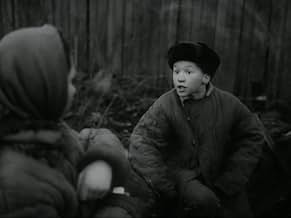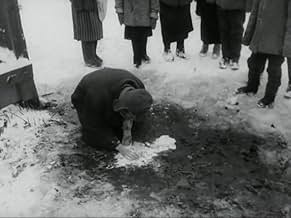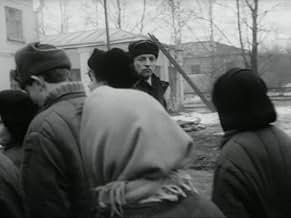VALUTAZIONE IMDb
7,5/10
990
LA TUA VALUTAZIONE
Aggiungi una trama nella tua linguaTwo children living in a remote mining town in the distant wastes of Siberia in 1947, survive poverty and hardship through the warmth of their friendship and a shared sense of humour.Two children living in a remote mining town in the distant wastes of Siberia in 1947, survive poverty and hardship through the warmth of their friendship and a shared sense of humour.Two children living in a remote mining town in the distant wastes of Siberia in 1947, survive poverty and hardship through the warmth of their friendship and a shared sense of humour.
- Premi
- 7 vittorie e 6 candidature totali
Recensioni in evidenza
10Céline
"Zamri, umri, vokresni!" is not, at first sight, a positive movie. And, as it develops, the tone gets darker. Vitali Kanevsky, the director, makes a very good use of black-and-white film. The lives of Galia and Valerka get increasingly unbearable. They make it bearable, however, by making easy bantering between them about which one's tea is better as they sell them to the people. Little things like that. In all the misery that he lives in, Valerka's main goal is still to catch a robber who stole his skates. They have not lost their childhood, not yet. Not until the end. It is interesting to note that "Zamri, umri, vokresni!" is also the name of a children's game in Russia. It means, literally, "Freeze, Die, Rise!"
I have seen "Don't Move, Die and Rise Again" described as one of the grimmest studies of childhood on film. Superficially, yes, but the young hero, Valerka, has a resilience that allows him to cope with most of the situations in which he finds himself. Children in Dickens or the Brontes often suffer far more. But, having said that, the setting of the first three-quarters of the film is almost unbelievably drab and depressing. We are in a mining community situated not far from Vladivostok during the season where snow is melting into slush and mud; the time, shortly after the end of World War II. Valerka, who lives with his unmarried mother, is an extremely streetwise early teenager. He makes what little money he can by brewing cups of tea for miners coming off their shifts and vies with Galia, another girl tea vendor in claims for making it from the freshest water. Their rivalry turns into a camaraderie which is developed and sustained throughout a film that is otherwise rather short on character interest. For the rest, it is the spirit of place that predominates, with a stark naturalism that reminds me at times of the "Bill Douglas Trilogy" with its equally uncompromising depiction of an unlovely semi-industrial wasteland. Only in the last half-hour is there much action. After being responsible for a minor train derailment, Valerka flees his home only to get involved with a gang of thieves. The ending is tragic but at the same time rather inconclusive. By having a discursive opening and middle and an action packed conclusion, the film suffers from erratic pacing. I also found it much less involving and consequently less moving that its material would suggest. Just another piece of Russian misery, then? Not quite. It contains several uneasy images that one recalls long after it is over, several of amputees and an extraordinary closeup of a passer by in a quiet street, smiling to reveal rows of grotesque metallic crowns. Above all "Don't Move, Die and Rise Again" has the virtue of memorability.
"Freeze Die Come to Life" - Vitaliy Kanevskiy's autobiographical drama. Post-war hungry years, a small city in the Far East. Around devastation, dirt, evil faces, former criminals, complete hopelessness. Only the friendship of 12-year-olds, a boy and a girl, living in the same hut, like a light ray in this dark scary surrounding world. Laureate of many film festivals, including Cannes. Fact: The author of the film, he was born in the Far East, and then served 8 years in prison.
Don't come to this expecting much in the way of a plot; it's a bunch of interconnected anecdotes about a boy living in a stark Siberian mining town. Apparently it's semi-autobiographical & filmed on a minuscule budget. Some online reviews claim the boy's mother is a prostitute (I thought her reference to that was metaphorical). The filmmaker certainly doesn't give much context away, but even without understanding much about Stalinist Siberia or knowing exactly what is meant by living in "the zone", for me the film conveys at once the frustration of living in exile with a child's failure to understand. Similarly, in his interaction with his caring older (girl) friend, the young protagonist conveys the often-heartless behavior of younger children. The actors are supposedly non-professionals; they do an excellent job. And the b&w photography is beautifully evocative. My only quibble is the "it's only a movie" ending.
Freeze, Die, Come to Life is the harrowing story of two adolescents, Velarka (Pavel Nazarov) and Galicia (Dinara Drukarova) attempt to cope with poverty and an unstable home life in a Soviet mining town in Siberia near the close of World War II. This was the first film by Russian director, Vitaly Kanevsky, who served eight years in a Soviet labor camp.
Though the title is the name of a Russian children's game, the children here are not playing any games; the stakes are too high. Velarka's mother is a prostitute and the family is poor. Both he and Galicia must sell tea to workers, convicts, and local Japanese POWs in order to survive. Their relationship starts out as antagonistic but they slowly develop a friendship and grudging admiration for each other.
Left to fend for himself, Valerka gets into serious misadventures such as putting yeast in a school sewer causing an overflow onto the city streets, derailing a train, and helping to rob a jewelry store. He must keep running to avoid the police and pursuing jewel thieves. Though the film is bleak, the sensitive relationship of the children and the courage they display is what will stay with you. The ending is grisly but (anticipating Kiarostami's Taste of Cherry by eight years) the cameraman giving directions to the actors reminds us that "it's also a movie".
Freeze, Die, Come to Life was turned down by Russian censors and had to be edited several times before it was approved, giving it a somewhat disjointed feeling. In its final version, however, it won the 1990 Cannes Film Festival's prize for Best First Film. Unfortunately, it received scant distribution in the West and has become an overlooked gem.
Though the title is the name of a Russian children's game, the children here are not playing any games; the stakes are too high. Velarka's mother is a prostitute and the family is poor. Both he and Galicia must sell tea to workers, convicts, and local Japanese POWs in order to survive. Their relationship starts out as antagonistic but they slowly develop a friendship and grudging admiration for each other.
Left to fend for himself, Valerka gets into serious misadventures such as putting yeast in a school sewer causing an overflow onto the city streets, derailing a train, and helping to rob a jewelry store. He must keep running to avoid the police and pursuing jewel thieves. Though the film is bleak, the sensitive relationship of the children and the courage they display is what will stay with you. The ending is grisly but (anticipating Kiarostami's Taste of Cherry by eight years) the cameraman giving directions to the actors reminds us that "it's also a movie".
Freeze, Die, Come to Life was turned down by Russian censors and had to be edited several times before it was approved, giving it a somewhat disjointed feeling. In its final version, however, it won the 1990 Cannes Film Festival's prize for Best First Film. Unfortunately, it received scant distribution in the West and has become an overlooked gem.
Lo sapevi?
- ConnessioniEdited into Histoire(s) du cinéma: Une vague nouvelle (1999)
- Colonne sonoreYosakoi-bushi
(Kôchi prefecture folk song)
I più visti
Accedi per valutare e creare un elenco di titoli salvati per ottenere consigli personalizzati
Dettagli
- Data di uscita
- Paese di origine
- Lingue
- Celebre anche come
- La breve infanzia di Valerka nel distretto di Sutchan
- Luoghi delle riprese
- Partizansk, Russia(mining town formerly known as Suchan)
- Aziende produttrici
- Vedi altri crediti dell’azienda su IMDbPro
- Tempo di esecuzione
- 1h 45min(105 min)
- Colore
- Mix di suoni
Contribuisci a questa pagina
Suggerisci una modifica o aggiungi i contenuti mancanti
























